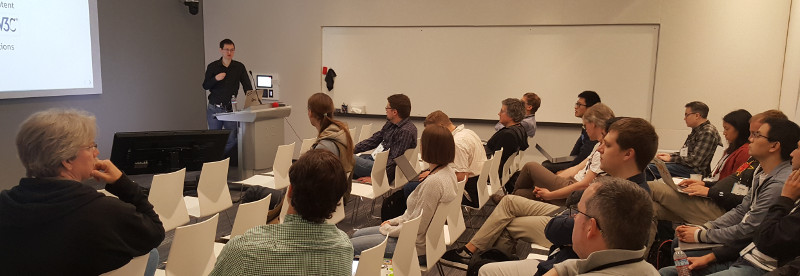BlinkOn 9: Working on the Web Platform from a cooperative
Last week, I attended BlinkOn 9. I was very happy to spend some time with my colleagues working on Chromium, including a new developer who will join my team next week (to be announced soon!).
This edition had the usual format with presentations, brainstorming, lightning talks and informal chats with Chromium developers. I attended several interesting presentations on web platform standardization, implementation and testing. It was also great to talk to Googlers in order to coordinate on some of Igalia’s projects such as the collaboration with AMP or MathML in Chromium.
In the previous edition, I realized that one can propose non-technical talks (e.g. the one about inclusion and diversity) and some people seemed curious about Igalia. Hence I proposed a presentation “Working on the Web Platform from a Cooperative” that gives:
- An introduction to Igalia and its activities.
- A description of our non-hierarchical model and benefits it brings.
- An overview of Igalia’s contribution to the Web Platform.

From the feedback I got, people appreciated the presentation and liked to get more insight on Igalia. Unfortunately, I was not able to record the talk due to technical issues. Of course, thirty minutes is a bit short to develop all the ideas and reply properly to all the questions. But for those who are interested here are more pointers:
-
About “equal salary” VS “cost of living”, you might want to read Andy Wingo’s blog posts “time for money” and “a simple (local) solution to the pay gap”. Several years ago, Robert O’Callahan had already wondered whether it really made sense to take into account the cost of living to determine salaries. Personally, I believe that as long as our “target salary” is high enough for all places where we work, we don’t really need to worry about this issue and can instead spend time focusing on more interesting agreements to keep making Igalia a great working place.
-
About dependency on the customers, see the last paragraph of “work groups” in Andy’s blog post “but that would be anarchy!” especially treating customers as partners. As I said during the talk, as long as we have enough customers we have some freedom to accept contracts that are more interesting for our strategy and aligned with our values or negociate improvements to existing contracts ; without worrying about unstability and uncertainty.
-
About the meaning of “Igalia”, the simple answer is “it does not mean anything”. If you join Igalia and get the opportunity to learn about the company history, there is a more complete answer about how the name was found…
-
Regarding founders of Igalia in 2001: Dape (who attended BlinkOn), Alex, Juanjo, Xavi, Berto and Chema are indeed still working at Igalia and in general, very few people have left Igalia since its creation.
Finally we had two related tricky questions from Google employees:
-
How do you sync with the browser vendors’ own agenda?
-
What can Google (or any other browser vendor) could do to facilitate involvements of third-party contributors?
One could enumerate different situations but unfortunately there is not a generic answer. In some cases collaboration worked very well and was quite successful. In other cases, things were more complicated and we had to “fight” to convince browser vendors to keep some existing code or accept new features.
Communication is very important. We try to sync with browser vendors using video conferencing or by attending conferences, but some companies/teams are more or less inclined to reveal information (especially when strategic products are involved). In general, I have the impression that the more the teams work close to the Web Platform, the more they are used to the democratic and open-source culture and welcome third-party contributions.
Although the ideal is to work upstream, we have recently been developing skills to manage separate forks and rebase them regularly against the main branch. This is a good option to find a balance between the request of the customer to implement features and the need of the browser vendors to focus on their own tasks. Chromium for Wayland is a good example of that approach.
Hence probably one way to help third-party contributors is to improve communication. We had some issues with developers not even willing to talk to us or not taking time to review or comment on our patches/CLs. If browser vendors could indicate that they don’t like an approach as soon as possible or that they won’t accept patches until some refactoring is complete, that would help us a lot to discuss with clients, properly schedule our tasks and consider the option of an experimental branch.
Another way to help third-party contributors would be to advertize more that such contributions are actually possible. Indeed, many people think that “everything is implemented by browser vendors” which can make difficult to find clients for web platform development. When companies rant about Google not implementing feature X, fixing bug Y or participating to standard Z, instead of ignoring them or denying the importance of the request, it would probably be more constructive to mention that they can actually pay consulting companies to do that job. As I indicated in the talk, we recently had such successful collaborations with Bloomberg, Metrological or AMP and we would be happy to find more!
There are probably more to reply to these questions, but that’s my quick thought on the matter for now. I’ll try discussing with my colleagues and see if we have more ideas to share.